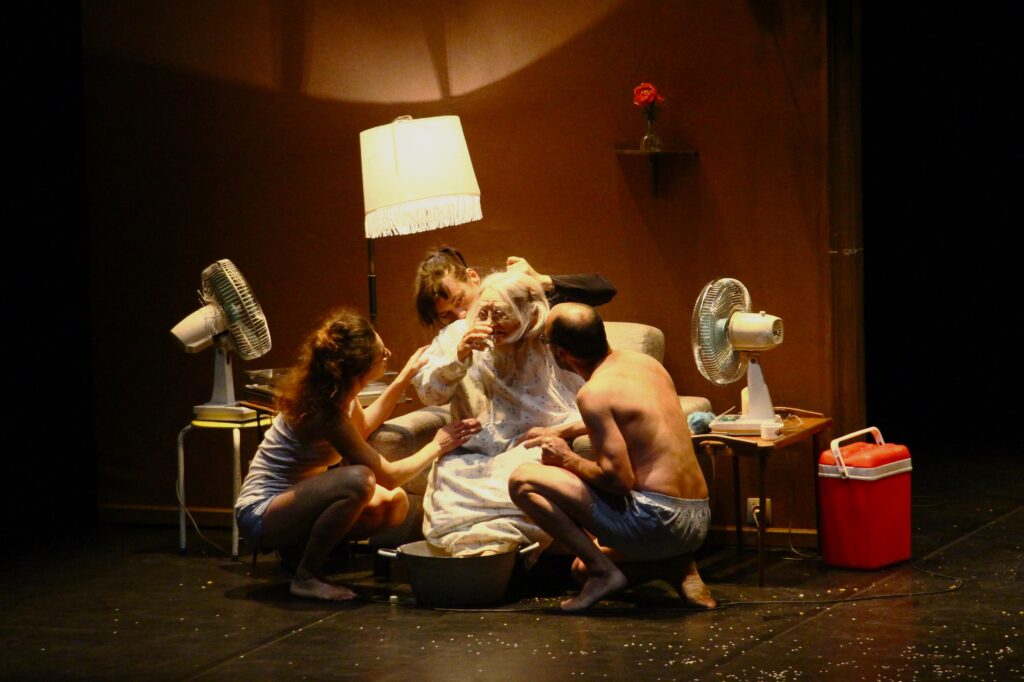
MimeLondon’s 2025 programme concludes with the London premiere of Dimanche by Belgian companies Focus & Chaliwaté at Sadler’s Wells Peacock Theatre in Holborn.
Set in the near future, this witty and tender production uses lo-fi special eZects, puppetry,
miniature vehicles, and video to tell parallel stories of a family maintaining their Sunday
routine while ignoring climate chaos, and three wildlife reporters documenting Earth’s last
living species. The show has received widespread acclaim for its technical ingenuity and
powerful environmental message and was a sell-out success at the 2023 Edinburgh
International Festival.
Ahead of opening at MimeLondon we caught up the creative trio behind the show who, fittingly, answered our questions as a collective.
Q&A with Julie Tenret, Sicaire Durieux and Sandrine Heyraud on Dimanche / MimeLondon 2025
What can you tell us about Dimanche?
The starting point of “Dimanche” was the observation of the gap between the awareness of the need to act facing climate change and our incapacity to translate this consciousness in our daily routines and lives. This gap gave us to see many surrealistic situations combining comedy and tragedy. We love the quote by Bill Watterson in Calvin & Hobbes that says: “It’s not denial. I’m just selective about the reality I accept.”
What was the original inspiration of the production for Focus & Chaliwaté to work together in this way?
“Dimanche” is the start of the collective work of our two theater companies, Focus and Chaliwaté. Our paths often crossed touring our respective previous shows and we finally decided to start working together in 2016. We had a common taste for unusual theatrical forms, an artisanal theatre of images without words so our collaboration came naturally to us. The absence of words arouses, in our case, visual creativity and the elaboration of other forms of expression. We use daily situations as a starting point to speak about societal subjects that affect us. We aim to create a visual and poetic language that draws from the intimate, from the little routines of the individual to the global impact of human activity. We try to recall big things with very simple means because it shows our vulnerability and fragility as humans and our smallness facing nature.
How important is it to address climate change in theatre?
We believe that art, humor and poetry call us to resistance by the singularity of the way each form expresses itself. Statisticians, scientists give us facts, artists can bring another insight. As the scientist will give us to see a suffering landscape that gives us the aim to take action, art can show its beauty and the desire to dream and trigger something at another level. Theatre creates a moment of fellowship and of sharing. Dreaming collectively, watching something collectively, looking at performers moving and acting in front of us can be very powerful, it creates the desire to be a community. Theatre opens doors that give us the possibility to go elsewhere, to experience something different. Concerning the humoristic approach in Dimanche we believe it preserves our sanity and that we feel less overwhelmed by the vicissitudes of life. From comedy in tragedy lurks the absurd and humour activates our sense of proportion.
What is it about blending mediums (puppetry, dance and theatre) that appealed to you in addressing climate change?
For “Dimanche” we brought together our different skills in physical theater, object theatre and puppetry, respectively. Gestures are a single way of creating evocative, suggestive and metaphoric images. Object theatre allows scenic writing very close to cinematographic writing. You can play with different levels and scales, creating spaces which are both realistic and like in a dream. It proposes a metaphoric and poetic language. As for marionettes, they can be very poetic and magical. But these different tools, multiple styles and medias, are and always stay at the service of the story to tell.

Were there any challenges that you had to overcome in the development?
When we started working on the show in 2016, the topic of climate change wasn’t as present and center stage as it is today. People told us that the subject was off-putting, moralizing. The challenge was to avoid lecturing the audience and to bring comedy into this tragedy. Humour brings an emotional distance that can be very powerful. It gives us another reading and understanding of a situation. We tried to walk the line between showing how terrible and urgent the situation is, and highlighting the humanity and hope to be held on to.
Is there anything you hope audiences take away from the production?
We hope the audience will feel concerned and preoccupied by the questions that we share and at the same time, we hope people will come out surprised and enthusiastic, having experienced a moment of magic. We hope it inspires and celebrates beauty, poetry and community. That it will trigger discussions and possibly changes.
Dimanche is at The Peacock Theatre, Sadler’s Wells, London from 29 January to 1 February
MimeLondon runs in venues across London from 14 January to 2 February 2025.














